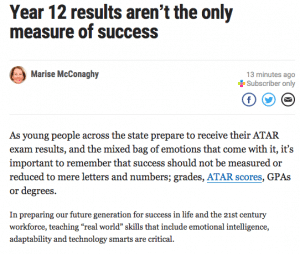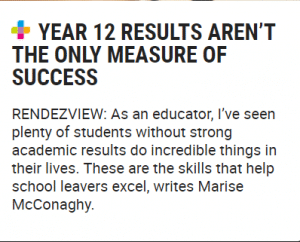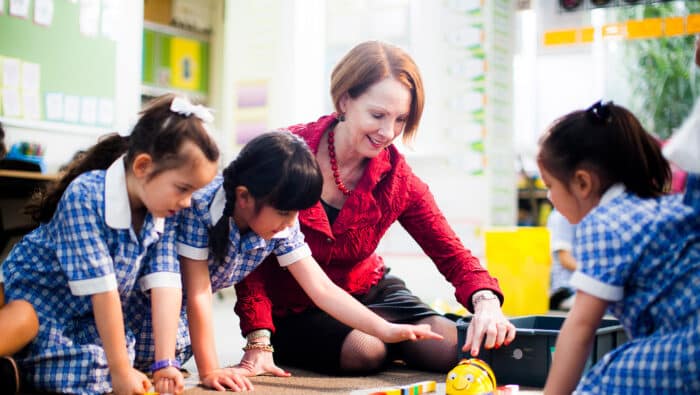In the media:
Year 12 results aren’t the only measure of success
As young people across the state prepare to receive their ATAR exam results, and the mixed bag of emotions that come with it, it’s important to remember that success should not be measured or reduced to mere letters and numbers; grades, ATAR scores, GPAs or degrees.
In preparing our future generation for success in life and the 21st century workforce, teaching ‘real world’ skills that include emotional intelligence, adaptability and technology smarts are critical.
In 2020, the World Economic Forum predicts that the most highly ranked skills for employability include Complex Problem Solving, Critical Thinking, Creativity, People Management and Coordinating with Others…skills that cannot be measured in test scores.


During my nearly three decades in girls’ education, I’ve seen plenty of students who are not particularly strong academic performers but excel in ‘real world’ skills and go on to do incredible things in their careers and lives. I remember one student, originally a country girl and was not academic as such – she absolutely loved art and design. She went on to create her own highly successful design business, travelling the world through textiles and integrating “Australiana” into her fashion items. Embassies, High Commissions and Art Galleriesare amongst her clients.
So what are these 21st century skills that students should be learning to future proof their employability? Emotional Intelligence is one.This may sound airy-fairy but it’s anything but. Developing social and emotional life skills that empower young people to interact and collaborate effectively with those around them is imperative for team work, collaboration and creativity. A skill that no one is simply born with, emotional intelligence is one that is learned and it’s the responsibility of parents, local support persons and teachers to lead by example. In the classroom, this means building emotional intelligence from as early as Year 1 and thanks to programs like Swinburne University’s Aristotle Emotional Intelligence Program, it is quickly being adopted across the country. Being able to identify, control, understand and express emotions is key to successful relationships in the workplace and in life.
Another key trait Gen Z’s need for the future is adaptability.Female entrepreneur and self-proclaimed Happiness Hacker, Penny Locaso, talks at length about Adaptability (AQ)being the secret weapon to staying relevant in the workforce of the future. Simply put, AQ is about an individual’s ability to adapt to a changing society and workforce – and the art of embracing and leveraging change. Lacaso says we will see AQ measures embedded and used as an indicator of future success in education and organisations. Social scientists and psychologists argue that developing AQ is even more critical than EQ (Emotional Intelligence) and IQ (Intellectual intelligence).
Being able to adapt to our changing world and the rapid introduction of new technologies also means that instilling young people with technology smarts is essential to their technology literacy. Many of the jobs that graduating students will fill in future years don’t even exist yet, but we know that these will be underpinned by significant technological advancements, so it’s important to have an understanding of how these work and what they mean. I believe this also includes helping young people understand when and how to switch off from technology – as we know the importance of good sleep, human connection and clearing the mind.


Finally, no matter what field young people choose, a core skill isresilience. I think of this as the ability to face life’s challenges with confidence. I’m seeing more and more young people with a fear of failure or of ‘not being perfect enough’ – so much so that they give up easily or won’t even ‘have a go’ to begin with. Teaching students a growth mindset, the ability to learn and grow from mistakes, and to bounce back stronger and wiser from life’s ups and downs is critical for success in life and in the workforce.
I’d like to finish by saying that I’ve attended a number of gatherings in my time and have been privileged to witness the journey of many girls and women over time. When I stand among high-powered women with varied careers, I often wonder: are they happy and fulfilled? My advice for the graduating class of 2018, is that success in life comes not only from having the confidence to achieve academically but from giving back to those around you in some way. Pursuing a path that will bring you happiness and personal fulfilment, whatever it may be!
Marise McConaghy is the principal of Strathcona Baptist Girls Grammar.


